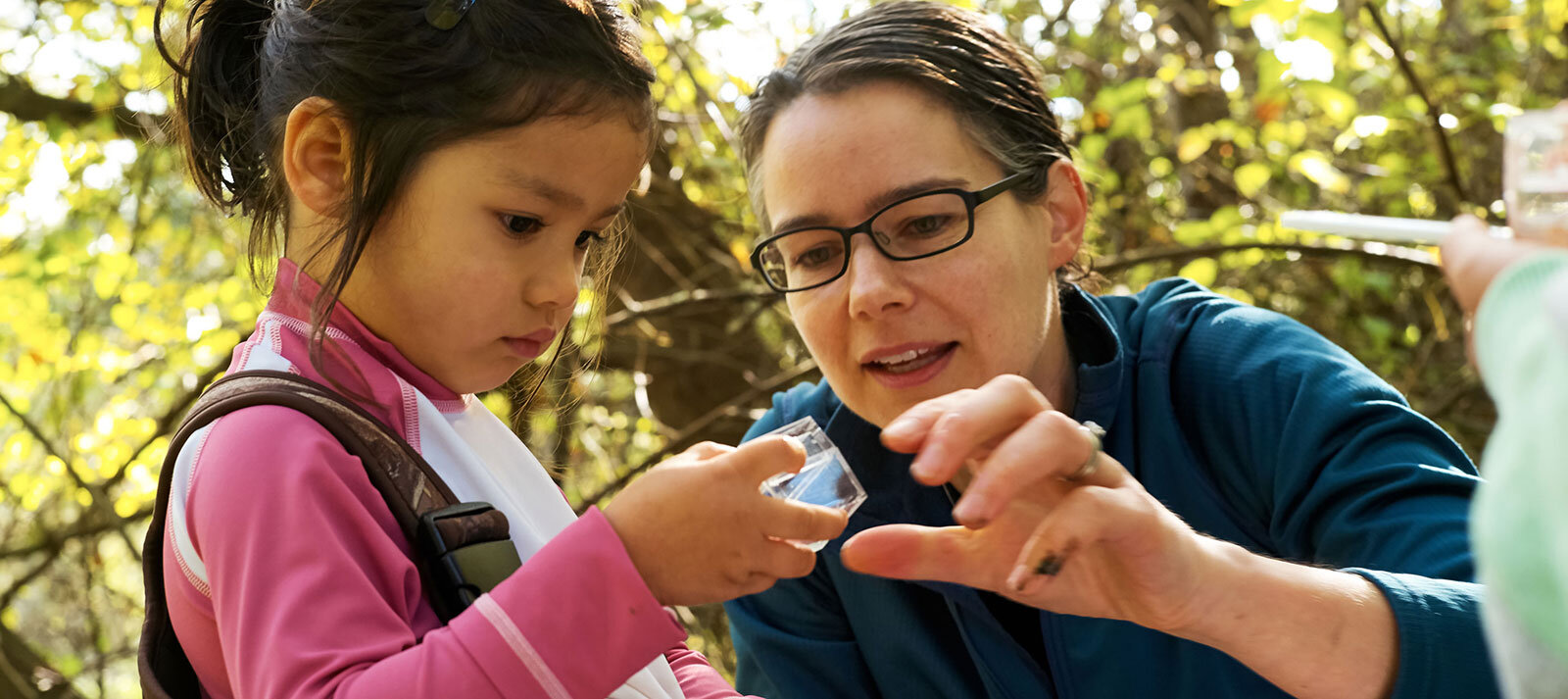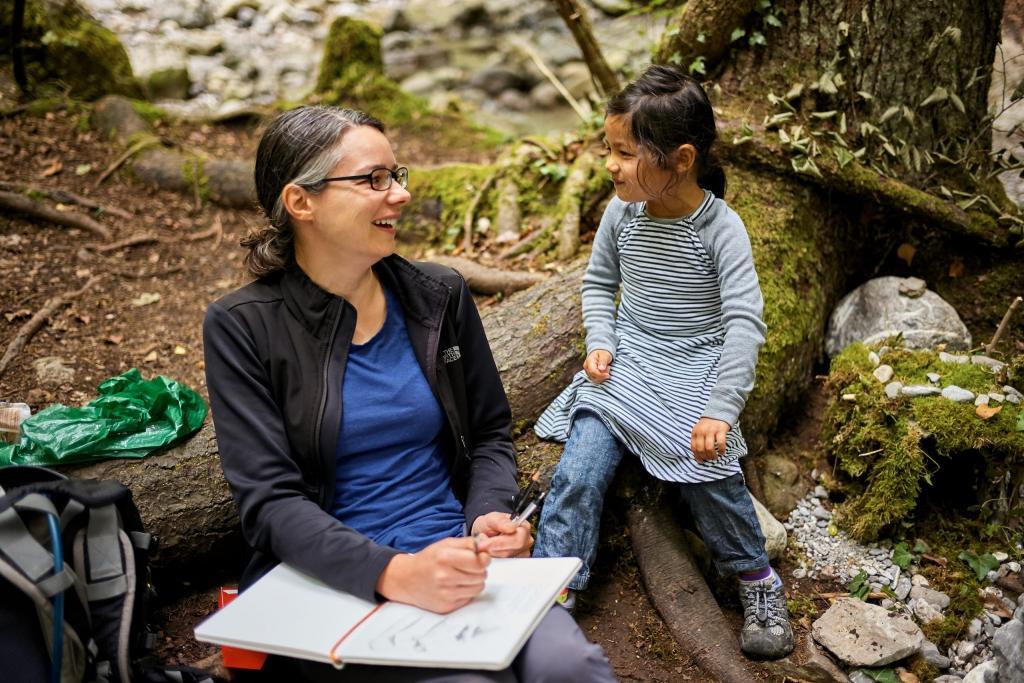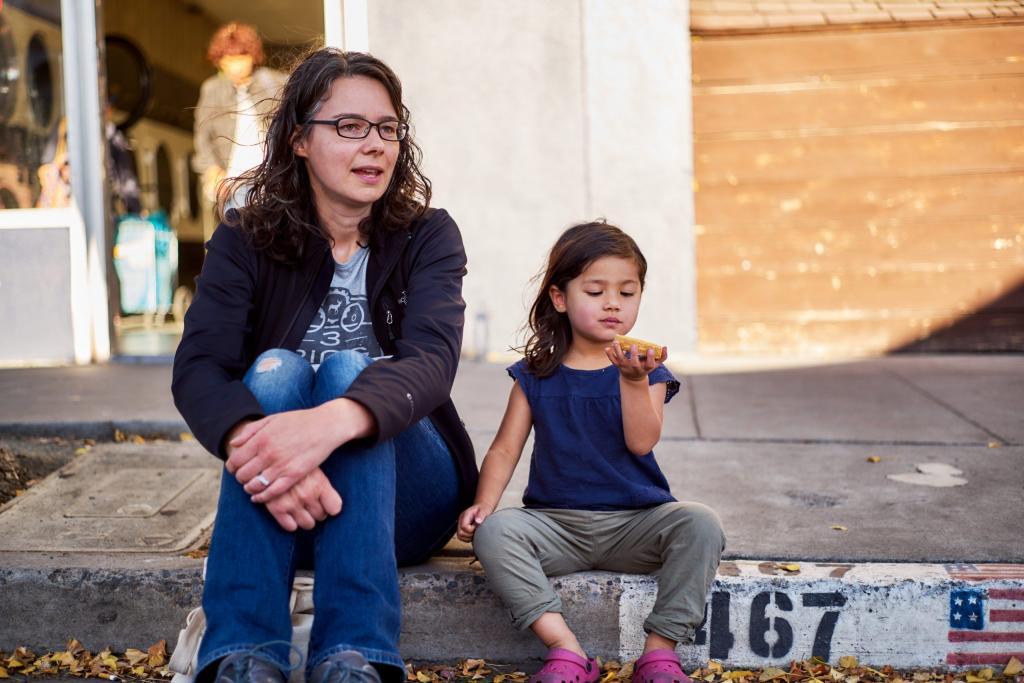
Your Parenting Mojo was born
You should know that I have no parenting instinct whatsoever.
A chance visit with out-of-town friends when my daughter Carys was four months old introduced me to Respectful Parenting/Resources for Infant Educarers (RIE), which was the beginning of my respect-based relationship with my daughter.
Then I decided I’d better get a Master’s in Psychology focused on Child Development, because I wanted to know more about how children work and what was my role in their development. I started the podcast because it seemed silly to be learning so much about what scientific research says about child development and not share it with others, and it seems as though there is an appetite for this information. In each episode I examine what the research says on one particular topic, looking to understand in what general direction the overall findings point as well as what academics who disagree with this direction have to say. By the end of each episode I aim to reach a conclusion about how I will handle the issue with my own daughter, and some ideas for how you can handle it with your child(ren).
"Thank you, Jen. Thank you for the hours, the dedication, the integrity, the rigorous process, and the unwavering commitment to quality that you have brought to the podcast. Thank you for impacting not only my approach to parenting and the relationship I have with my son, but also my world view.
Thank you for providing a resource of unparalleled caliber FOR FREE! You truly can't imagine how impactful it has been, not only for me, but also for my husband and my coworkers, with whom I can not stop discussing episodes, teasing out the rich and complex content, debating and examining.
Each episode sits with me for a long time, but some that have had the most dramatic impact include 'Is my Toddler Racist,' 'Parenting: All Joy and no Fun?,' 'Do you punish your child with rewards?,' 'Help! My toddler wont eat vegetables,' 'How to prevent Sexual Abuse', and surely the most profound: the collective series on white privilege."
- With sincere gratitude, Lindsey T.
About the Mojo
Some listeners have asked why I chose a name that doesn’t seem to do the show justice (in their words). I picked it for two reasons: firstly because while we’re taking a serious look at parenting and children’s development, I don’t want to be serious all the time. We do laugh on occasion, even if it’s just at ourselves (myself).
The second reason is that I really believe that parents have inside them the tools they need to be awesome parents, and the show can give you a bit of special sauce - a bit of mojo – to help you get there.
That’s also why I don’t accept advertising on the show: it seems counterintuitive to spend the whole show telling you you have what you need to be a great parent and then try to sell you a Disney cruise or the latest fad in toys in a commercial break. If you love the show and you’d like to support the massive amount of effort and moderate amount of money it takes to produce it, please consider visiting the Donate page.

Where do you most need help?
To make it easier to find what you need, I’ve organized the contents of the site into four portals to help you to find the content that best addresses challenges you might be struggling with right now.
Just head on over to the home page and look for the picture of me and Carys gazing out at Mont Blanc. There's a drop-down menu from which you can select the category that's most relevant to you.
Or if you prefer, you might like to browse some of the most popular episodes, which include:
- How to raise emotionally healthy boys: Even parents of girls might want to learn about how the ways they interact with boys they know can shape these boys’ relationships with our daughters down the line…
- How to raise a girl with a healthy body image: This one is super-personal to me
- Sleep! (And how to get more of it): I’ve been told that this is one of the most balanced and useful pieces (blogs/podcasts/articles) that my listeners have seen/heard on this topic
- How to Raise a Wild Child: Why getting outdoors is so important for children, and how to do it even if you know nothing about “nature”
- How to potty train a child: I don’t really believe in potty training. Learn why in this episode – and what to do instead.
Subscribe to Your Parenting Mojo – It’s free
If you subscribe to the show through iTunes, Stitcher, or wherever you listen to podcasts then you’ll get new episodes when they’re released every other Sunday night. But if you subscribe here through YourParentingMojo.com then you’ll also get a newsletter on the weeks when I don’t publish a blog post, which often contains analyses of studies I’m reading for upcoming episodes, links to new blog posts that tie ideas together across episodes, calls for questions for upcoming guests, and occasionally calls for co-interviewers as well.
When you subscribe, I’ll also send you a short article on Five Parenting Myths We Should Leave Behind. Really, there’s so much information out there on parenting and child development that contradicts the scientific research that it was tough to narrow it down to just five. But I picked the ones I think will have the most impact on you and your family if you decide not to do these things any more.
Just enter your email address below. I promise I’ll never sell, rent, or give away your information.
I really appreciate how you not only research the scientist's claims on their work, but also you look at replication studies, which is something us parents would not be able to get from from the average Ted talk. This aspect of the podcast helped me by allowing me not to place a lot of weight on certain attributes such as grit and mindset. I also appreciate your focus on how different cultures have different practices which end up raising kids more in line with their culture. This helped me relax about the different ways other family members interact with my kids, and its definitely good to feel that there is more than one way to raise a child.
The most profound episode for me that you did however was the importance of risky play for kids. I am very overprotective with my kids and this episode provided me with so much perspective on their risky behavior and it changed my attitude towards it or any accidents they may have. I now view minor accidents as a normal part of childhood that would help kids be more resilient, whereas before I would feel that I failed to protect my kids from harm. Thanks for the podcast!
- Basma A.
Courses & Membership Group
In addition to the podcast, which is freely available to everyone, I’ve also created some additional resources that might help you.
If you love the ideas that you hear about on the show but struggle to apply them in your own life, you might be especially interested in the new membership group I’ve created. We tackle a different issue each month: the first three months focus on reducing the incidence of tantrums to setting goals to getting on the same page as your co-parent, and after that we select topics by group consensus, so you learn the strategies and tools that will be most useful to you.
For my Psychology master’s thesis I studied how children learn even in the absence of being told what to learn (e.g. via a curriculum). Out of this thesis – and a year’s worth of additional research – we reached the decision to homeschool Carys when she is old enough. Since everyone I talked with about homeschooling asked me the same questions about it, I created a course to help families think through every aspect of making the decision to homeschool.
I know homeschooling isn’t right for all families, and that some families are committed to school – particularly public schools. But many of those families are also worried about the quality of education their child will receive in public school, and they also have a goal of supporting their child’s intrinsic motivation to learn (which school is not so adept at doing). The thesis for my Master’s in Education was a course to help parents support their child’s learning in school.

Still reading? You must be really interested in my approach and philosophy…
I think that, too often, the people who offer information at child development don’t tell us much about their beliefs and philosophical approach to parenting. This can make it difficult for parents to understand how the information presented fits with their own approach to parenting, and whether the recommended strategies and advice are going to fit. For example, if you don’t believe in rewarding your child for behavior then you’re going to be bummed if you get half way through my episode on potty training and find that I recommend sticker charts and candy rewards (note: you won’t actually find that in my episode!).
So what will you find on Your Parenting Mojo?
Respectful parenting
I found Magda Gerber’s Resources for Infant Educarers (RIE) before I even found scientific research on parenting! I always believed that love was necessary but not sufficient for a great parent-child relationship, but I didn’t know what was the missing ingredient until I read her book Raising Your Self-Confident Baby. I don’t follow any philosophy dogmatically, which means that I didn’t follow all aspects of RIE. But my overall approach is to follow RIE unless I have a good reason not to.
RIE’s guidelines are geared toward children aged 0-2 so our family is no longer in that window, but once you begin a respectful relationship with your child it’s pretty hard to stop…
We use the science, but we also look beyond the science.
Scientific research is the foundation of everything I do. You won’t find a recommendation on Your Parenting Mojo that doesn’t have scientific research to back it up, unless I explicitly say “this is just my opinion, but…”.
But I don’t just find one scientific study and then rely solely on that. The average podcast episode has twenty references to other books and studies that I read that laid the groundwork for the topic and that that are the latest information we have. I look for studies that all seem to point in one direction, as well as studies that point the other way – and then I try to understand the discrepancies between them.
I’m especially suspicious where a single researcher becomes overly attached to a topic, as I’ve learned the hard way that the evidence supporting these theories tends to be much shakier than when multiple researchers are looking at an issue.
Since the beginning of the show, I’ve always made a point to call out where the research falls short: where effect sizes are small; where a paper’s discussion section reports a MUCH rosier outcome than its results section; where the bulk of the research points in one direction and where the jury really still seems to be out.
Since the beginning, I’ve also called out flaws in the way the research applies to different people: there is a tendency for researchers to take a convenience sample of children whose parents have volunteered them for research studies – and these children are usually White – and then talk about the results as if they were applicable to all children everywhere. In the ‘60s researchers did this because they didn’t know better; now they do it because it’s cheap and easy. They do usually call for more research on a broader population at the end of their study, though (although these rarely ever seem to happen).
Some time after I recorded an episode with Professor Diane Levin on Why we shouldn’t ban war play, I realized my obligation was greater than just calling out bad sampling methodology. Professor Levin’s work concludes that children gain a lot out of war play, and that supporting it in a developmentally appropriate way actually benefits children – a conclusion with which I agree from a developmental perspective. We did not, however, address the fact that it simply isn’t safe for some groups of children to engage in war play around people they don’t know, because they might get shot.
I regret that oversight, and since then I’ve made an extra effort to assess whether the entire premise of a study or body of research is flawed or biased in such a way that makes it difficult to generalize to all children (or at least all children from Western, Educated, Industrialized, Rich, Democratic (WEIRD) societies). One example: one study on fantasy play provided part of the script that was used with children in the study: “We are going to make up different stories using the toys on the table. We will make up a story and play it out with the toys. Good stories have a beginning, a middle, and an end, and use lots of imagination and pretend,” but we had learned in a previous episode on storytelling that African American children don’t always tell stories with this kind of structure and they might have been verbally or physically chastised for making up fictional stories. How could the researchers claim that the results of the study, which had been conducted on a “primarily Caucasian” sample, was applicable to all children?
We also make sure to look for the anthropological perspective to see whether the particular issue we’re facing with our child exists only because we are in a WEIRD society or whether children in all cultures experience similar things. (Tantrums: yes! Sleep problems: not so much!)
Understanding the links between development AND learning
Wherever I see information about parenting online, it usually looks at children from one of two perspectives: development OR learning. We tend to focus a lot on development in the early years, and then as soon as the child starts school we switch to thinking about learning. In reality, these aspects are intertwined throughout our lives: we are always developing and learning. Sometimes development leads learning; sometimes the other way around. We need to understand how these interact so we can work with our children appropriately.
An example: people expect my daughter to say “thank you” when they give her something, and to ‘act gratefully.’ But she is just starting to develop theory of mind, which means that she is starting to understand that other people have different thoughts than she does, and she doesn’t understand time beyond the end of this week. I can train her to say “thank you,” but she can’t truly experience gratitude until she understands that someone did something for her, and make a plan to repay her benefactor with a favor that they will appreciate at some unspecified point in the future. I can scaffold her ability by doing things like encouraging her to think about how other people feel (supporting her learning) but ultimately we have to wait for her development to catch up. (Lots more info on this in the episode Why Isn’t My Child Grateful?, if you’re interested).
The same goes in reverse for many problems children have early on in school, which stem from a lack of developmental readiness to sit still and pay attention to the teacher.
We examine the interplay between learning and development all the time here, because it’s the best way to both understand our children and support them as they grow.
We turn all this into tools you can use
I know how hard it is to sort through all the parenting advice out there – much of it anecdotal; some of it based on one study that happens to support the writer’s point.
I examine the research in-depth, so you can be confident when I say “the body of the evidence suggests that…”.
I translate all this research for you into practical tools you can actually use to support your child’s learning and development. And guess what? When you put some of these tools to use, your life actually might start to get easier, too.


